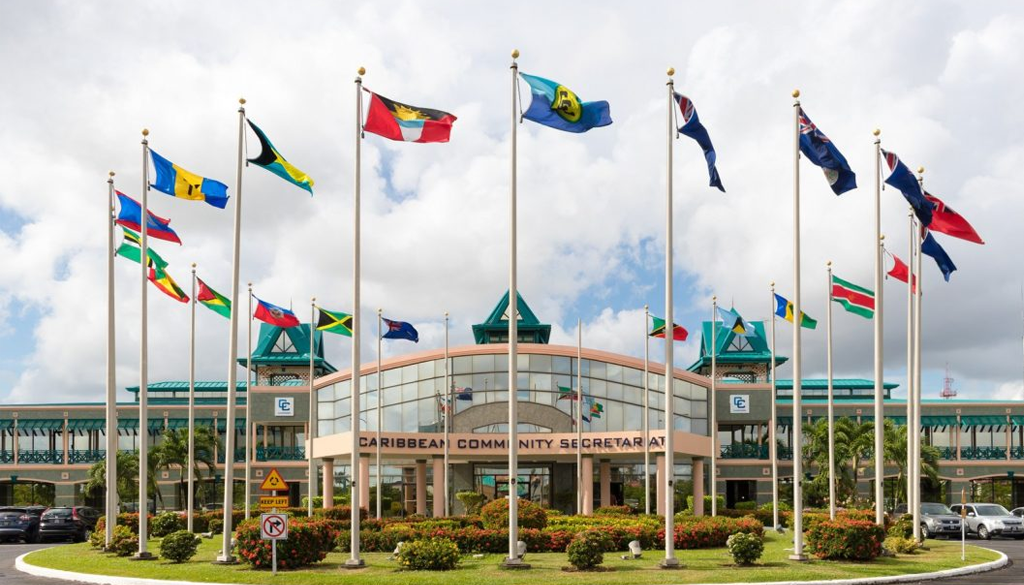Caribbean Community (CARICOM) Ministers of Health met on Thursday, 14 October to discuss matters on the regional health agenda, with the COVID-19 situation receiving priority attention.
The Ministers received an update on COVID-19 transmission and death rates in the Region at the Forty-First Meeting of the Council for Human and Social Development, (COSHOD) on Health, chaired by Lieutenant Colonel Jeffrey Bostic, Barbados’ Minister of Health and Wellness.
According to the Caribbean Public Health Agency (CARPHA), its member states continue to record higher rates infections at 3.6% compared to the US (1.5), UK (3.2), Latin America (0.5) and Canada (1.6) as at October 7. The death rate in the Region is also concerning at 5.1% compared the US (1.9), UK (0.6), Latin America (0.5), and Canada (0.9) as at 7 October.
The highly contagious Delta variant, according to CARPHA, is present in 25 Caribbean countries and in 16 CARPHA Member States (CMS) with daily surges in some countries attributed to the circulation of Delta.
In urging sustained surveillance and control measures, CARPHA said that high transmission of Delta coupled with low vaccination levels, strongly increased the risk of high morbidity and mortality, should the variant take a foothold in the general population.
The Ministers of Health supported CARPHA’s recommendation for enhanced public health measures including vaccination to reach herd immunity. They also endorsed recommendations for CARPHA Member States to report COVID-19 surveillance data on a timely basis to facilitate adequate regional analysis and response.
CARPHA also reported on its work to make the Region a safe place to travel. Those efforts include establishing a COVID-19 surveillance database called the Tourism and Health Information System (THiS), and facilitating knowledge sharing and capacity building in COVD-19 guidelines. Through the latter, CARPHA has trained over 7900 industry operators.
The Meeting heard that CARPHA awards the Caribbean Traveller’s Health Assurance Stamp for Healthier Safer Tourism to operators with trained staff and those who utilise the Information System. The Caribbean Tourism Organisation, the Caribbean Hotel and Tourism Organisation, and the World Travel and Tourism Council recognise the Health Assurance Stamp in promoting the Region as a safe travel destination.
CARICOM Ministers of Health lauded CARPHA’s comprehensive response to COVID-19 and expressed their support for the implementation of the CARICOM recommended Harmonised Minimum Guidelines for Cruise Ships, to protect the region’s tourism sector.
As the COVID-19 pandemic persists, concerns are heightening about its impact on child immunisation rates. In this regard, CARICOM Health Ministers committed to identifying and implementing ways to manage COVID-19 without negatively affecting the human and financial resources in addition to other activities around immunisation programmes.
COHSOD received an update on COVID-19 vaccine supplies and distribution, as CARICOM Member States intensify their vaccination campaigns to reach herd immunity of 80% of their population. In noting the progress of the COVAX Facility to deliver contracted doses to the CARICOM countries, they also received an update on engagements with the United States on its donations of Pfizer vaccines, and the work UNICEF is doing as it supports the African Medical Supplies Platform (AMSP) in logistics and distribution of Johnson and Johnson vaccines.
Even as Ministers acknowledged the challenges with access to vaccines, they also recognised concerns regarding vaccine hesitancy, particularly among healthcare workers. Recognising the benefit of COVID-19 vaccination uptake among critical health influencers, the Ministers agreed to strengthen vaccine promotion programmes targeting this group in collaboration with PAHO and other partners. They also agreed to keep issues pertaining to the procurement of vaccines high on the agenda, recognising that Herd immunity will be challenging, without adequate access vaccines.
As the increased prevalence of non-communicable diseases (NCDs) continues to expose the vulnerability of the Region’s populations to the COVID-19 virus, COHSOD Ministers of Health agreed to a Whole of the Region Approach to tackling this challenge. They pledged support to two Inter-Governmental Working Groups, which were set up to articulate policy recommendations to COHSOD and CARICOM Trade Ministers on how they could harmonise trade and health interventions to address unhealthy diets, obesogenic environments and the harmful use of alcohol. In this context, COHSOD expressed appreciation to the University of the West Indies for its continued support in addressing the burden of NCDs to the Region.
Another critical matter related to the healthy diets the Ministers discussed, was the process involved in revising the standard of labelling pre-packaged foods, including Front of Package Labelling. In this regard, COHSOD urged Member States to engage their national standards development processes and regional representatives to ensure a mutually beneficial way forward, regarding the revised draft standard under consideration.
Other matters the Health Ministers discussed included Member States’ capacity to prevent and manage heart attacks; interventions to strengthen human resources for health response to emergencies, including COVID-19 and emerging pandemics; and the Community’s representation on the Global Fund Board for the period 2021-2022. They also endorsed a second three-year term for the current Special CARICOM Special Rapporteur on Disability.




